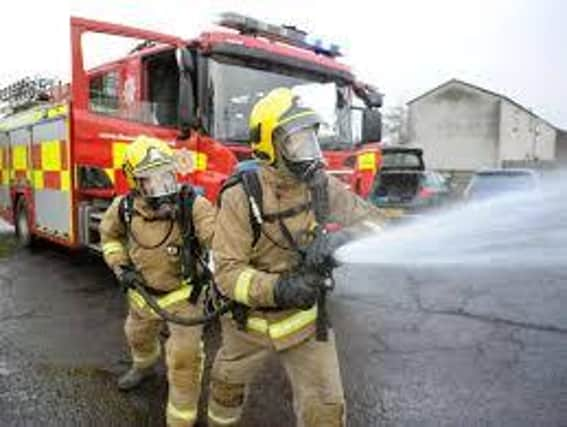One in twenty Scottish fire brigade staff isolating due to coronavirus


UK-wide, nearly 3,000 fire and rescue staff are in self-isolation and unable to work – 5.1 per cent of the total workforce. Just under 2,600 of them are operational firefighters and control staff, making up 5.3 per cent of the total.
However, in some areas of Britain the number of staff absences relating to the outbreak have reached 12 per cent, sparking calls for testing across the industry from the Fire Brigades Union. Emergency fire control rooms, which have fewer staff, have been worst hit in some areas, with some control rooms losing 15.9 per cent of their staff.
Advertisement
Hide AdAdvertisement
Hide AdThe Scottish government has committed to initial limited testing of firefighters and control staff which has already begun at Glasgow airport. However, in other areas of Britain, no testing has taken place.
The FBU has said that, without urgent testing of frontline personnel, there will inevitably be an impact on brigades’ ability to provide fire cover and respond to other emergencies, including their work supporting the coronavirus response. Fire and rescue services in the UK are operating with 11,500 fewer firefighters than in 2010.
Some firefighters are now driving ambulances and assisting ambulance staff; delivering food and medicines to vulnerable people; and working with the police to move dead bodies, after the FBU reached an agreement with fire chiefs and fire and rescue employers.
In London Fire Brigade, 472 firefighters and control staff are in isolation, nearly 10 per cent of the total. Overall, 478 London Fire Brigade staff are in isolation, an increase of nearly 200 since 20 March. West Yorkshire’s control room has 15.9 per cent of its staff in isolation, while in Mid and West Wales it is more than 13 per cent.
Bedfordshire has the highest proportion in isolation, with 55 firefighters and control room staff, 12 per cent of their total.
Testing has been made available to 50 personnel from Northern Ireland Fire and Rescue Service who have symptoms. A total of 147 staff – 7.5 per cent - are currently in isolation. In Wales, where 178 staff are in isolation, the devolved government has committed to testing other emergency service personnel once tests have been secured for NHS staff.
Emergency fire control staff handle 999 calls and provide vital fire survival guidance for areas of up to 5 million people from a single room. Should one member of staff contract the virus, the emergency call infrastructure for an entire region could be at risk.
Firefighters will now also be able to fit masks and respirators for NHS staff and deliver Personal Protective Equipment (PPE) and medical supplies to NHS trusts, after a further agreement was reached on Thursday 9 April.
Advertisement
Hide AdAdvertisement
Hide AdWhile the FBU has called for firefighters to cease all non-essential, non-emergency interactions with the public, they will continue to come into contact in emergency situations and as part of their coronavirus response work, placing them at greater risk of infection.
Matt Wrack, FBU general secretary, called for Westminster to follow the Scottish Government’s lead.
He said: “The Westminster government is playing with fire by not testing firefighters and control room staff for coronavirus. Currently, crews are maintaining services, but this will become increasingly difficult as the virus spreads.
“There are already thousands of firefighters and control staff in self-isolation, only a fraction of which will have the disease. If we aren’t able to find out exactly who is infected, and more staff isolate unnecessarily, services will be put on a dangerous knife-edge.”
He added: “Of course testing of NHS staff has to be a priority, but firefighters and other emergency service personnel are also at serious risk. The very safety of the public relies on them being able to attend work. There needs to be a clear and deliverable testing strategy for all workers required to continue at work.
“The government failed to secure test kits in sufficient numbers early in the pandemic and now frontline services are paying the price. Devolved governments have begun to take steps in the right direction, but in Westminster time is standing still – ministers need to get to grips with this crisis and ensure that all emergency service personnel are tested as soon as possible.”
A message from the Editor:
Thank you for reading this story on our website. While I have your attention, I also have an important request to make of you.
With the coronavirus lockdown having a major impact on many of our advertisers - and consequently the revenue we receive - we are more reliant than ever on you taking out a digital subscription.
Advertisement
Hide AdAdvertisement
Hide AdSubscribe to scotsman.com and enjoy unlimited access to Scottish news and information online and on our app. With a digital subscription, you can read more than 5 articles, see fewer ads, enjoy faster load times, and get access to exclusive newsletters and content. Visit https://www.scotsman.com/subscriptions now to sign up.
Our journalism costs money and we rely on advertising, print and digital revenues to help to support them. By supporting us, we are able to support you in providing trusted, fact-checked content for this website.